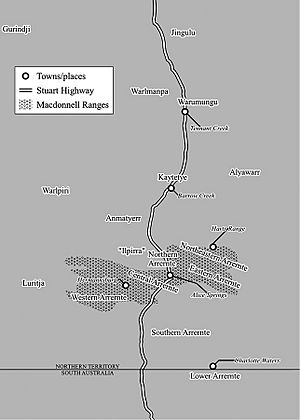Kaytetye language facts for kids
Quick facts for kids Kaytetye |
||||
|---|---|---|---|---|
| Native to | Australia | |||
| Region | central Northern Territory | |||
| Ethnicity | Kaytetye people | |||
| Native speakers | 109 (2021 census) | |||
| Language family |
Pama–Nyungan
|
|||
| AIATSIS | C13 | |||
|
||||
Kaytetye (also known as Kaititj, Gaididj, Kaiditj, or Kaytej) is an Aboriginal language from Australia. It is spoken by the Kaytetye people in the Northern Territory. This area is north of Alice Springs, near places like Barrow Creek and Tennant Creek.
Kaytetye is part of a larger group of languages called Pama-Nyungan languages. It is closely related to other languages in the Arandic family, such as Alyawarra. Alyawarra is a dialect of the Arrernte language.
Sadly, the Kaytetye language is considered to be in danger. In 2021, only 109 people spoke it. Even though it is still used for talking face-to-face among all age groups, fewer people are learning it.
The Kaytetye people also have a special sign language called Akitiri or Eltye eltyarrenke.
What Makes Kaytetye Special?
Kaytetye has some very interesting and unusual features. These make it different from many other languages around the world.
Unique Sounds
One special thing about Kaytetye is how its words are built. Many words start with a vowel sound and end with a soft 'schwa' sound. Full, strong syllables usually only appear in the middle of a word. For example, the word for 'three' is arrkwentyarte.
Kaytetye has only two main vowel sounds. But it has many different consonant sounds! Some of these consonants are quite rare. They include sounds that are "pre-stopped" or "pre-palatalized." This means the sound starts with a quick stop before the main consonant.
Interesting Grammar
The grammar of Kaytetye also has unique rules.
- Family Words: When you talk about family members, like 'brother' or 'mother', you must show who they belong to. For example, 'my brother' or 'your mother'.
- Special Pronouns: Kaytetye has many different ways to say 'we'. These pronouns change depending on who you are talking about. They can show if the people are from the same family group or generation. For example, there are different words for 'we' if you are talking about:
* You and your sibling (brother or sister). * You and your parent. * You and someone from a different family group. This means there are twelve different ways to say 'we' in Kaytetye!
- Movement in Verbs: Kaytetye verbs can include information about movement. They can show if someone went somewhere before doing an action, after doing an action, or while doing an action. For example, there are different ways to say 'talk' depending on if you 'talk after going' or 'talk while coming'.
Famous Kaytetye Speakers
One important person who learned Kaytetye was Erlikilyika, also known as Jim Kite. He learned the language while working on the Overland Telegraph Line. This was a very important communication line built across Australia. Jim Kite later worked as an interpreter. He helped famous explorers and scientists, Spencer and Gillen, understand and talk with the local people.
 | Anna J. Cooper |
 | Mary McLeod Bethune |
 | Lillie Mae Bradford |


